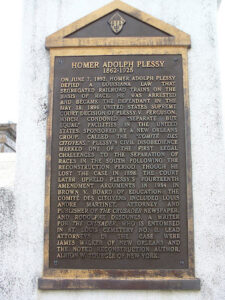
*Homer Plessy, a Black businessman and civil rights activist, was born on this date in 1863.
From Louisiana, Plessy was the second child of Adolphe Plessy and Rosa Debergue Plessy. His father died when he was five, and his mother, Rosa, remarried shortly after that. Plessy was apprenticed as a shoemaker, the profession of his stepfather and maternal relatives. In 1887, he married Louise Bordenave at St. Augustine Church. In 1890, then-state legislator Murphy Foster (grandfather of Louisiana Governor Mike Foster) wrote the Separate Car Law, which called for segregating passenger trains in Louisiana.
In 1892, Homer Plessy challenged a two-year-old streetcar law that separated passengers traveling on trains in Louisiana. His action made him a plaintiff and defendant in the landmark U.S. Supreme Court Case of Plessy vs. Ferguson in 1896. The year he challenged segregation, the Citizens’ Committee, a group of influential Black civic and business leaders, chose Homer Plessy to board the white car of the East Louisiana Railway, leaving New Orleans and traveling to Covington. The Citizens’ Committee’s strategy was to purposely break the Separate Car law so that a case could go before the state supreme court.
The case eventually led to the United States Supreme Court ruling against Plessy. The Supreme Court upheld the statute of "Separate but Equal." Unfortunately, this landmark decision was eventually used to justify segregation in education, public accommodations, and transportation. After the case, Plessy became anonymous and became a life insurance collector with People’s Life Insurance Company. Homer Plessy died on March 1, 1925, and is buried in his mother’s family tomb in St. Louis Cemetery.
On January 5, 2022, Louisiana Gov. John Bel Edwards on Wednesday granted a posthumous pardon to Homer Plessy, the man at the center of the landmark civil rights Supreme Court ruling, Plessy v. Ferguson. Plessy's descendants joined the governor at a ceremony in New Orleans, where he officially signed the pardon. The ceremony, which city leaders and relatives attended, was near the original location where Homer Plessy was arrested nearly 130 years ago.
The African American Desk Reference
Schomburg Center for Research in Black Culture
Copyright 1999 The Stonesong Press Inc. and
The New York Public Library, John Wiley & Sons, Inc. Pub.
ISBN 0-471-23924-0